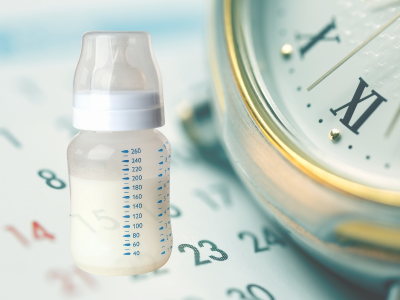Creating the best baby feeding schedule is essential for your baby’s growth, health, and happiness. Whether you’re a first-time parent or looking to adjust your routine, having a clear feeding plan ensures your baby gets the nutrition they need at every stage of development.
In this article, we’ll explore expert-recommended feeding schedules for newborns, infants, and toddlers, along with practical tips to make feeding time stress-free for both you and your little one. From breastfeeding and formula feeding to introducing solids, you’ll find everything you need to know to establish a schedule that works best for your family.
Keep reading to discover the best baby feeding schedules and gain insights that will support your baby’s nutritional needs while creating a healthy routine!
Pro Tip: Bookmark this guide for quick reference as your baby grows.
Why You Need the Best Baby Feeding Schedules
Feeding schedules are not just about timing meals; they’re about ensuring your baby gets the nutrients they need at the right developmental stages. A best baby feeding schedule is crucial for:
- Growth and Development: Babies have unique nutritional needs at different ages, so following a baby feeding schedule by age ensures that they get the right amount of milk and solids as they grow.
- Sleep: A regular feeding schedule can help establish a healthy sleep routine, which benefits both baby and parents.
- Health and Well-being: Ensuring that your baby is well-fed supports their immune system, growth, and overall health.
When to Consult a Pediatrician: If your baby isn’t gaining weight, seems unusually fussy during feedings, or struggles with latching or bottle feeding, it’s essential to consult your pediatrician for advice on adjustments to their feeding routine.
Newborn Feeding Schedule: Week by Week
The first few weeks of your baby’s life are crucial for developing a feeding routine. Newborns have small stomachs and need to feed frequently. Here’s a breakdown of what a newborn feeding schedule: week by week might look like:
- 0-2 weeks: Newborns typically feed every 2-3 hours, day and night. Whether you’re breastfeeding or formula feeding, they’ll need around 8-12 feedings in a 24-hour period. You may find yourself adjusting the best baby feeding schedule based on your baby’s hunger cues.
- 2-4 weeks: At this stage, your baby may begin to stretch out their feedings, especially at night. Some babies might be able to go 3-4 hours between feedings during the day, but the overall number of feedings remains around 8-10 per day.
- 4-6 weeks: Babies may start to sleep for longer periods at night, allowing for longer stretches between feedings. Your best baby feeding schedule may start to include 6-8 feedings per day, with a bit more consistency in timing.
When to Consult a Pediatrician: If your newborn has trouble feeding, seems lethargic, or isn’t producing enough wet diapers (less than 6-8 per day), reach out to your pediatrician to rule out any underlying issues.
Best Baby Feeding Schedules Week by Week: From 3 to 6 Months
As your baby gets older, they will likely be able to go longer between feedings and begin to develop a more predictable routine. Here’s what you can expect:
- 3-4 months: During this phase, your baby might start sleeping longer at night, so you may experience fewer night feedings. Expect to feed your baby every 4-5 hours, typically 5-6 feedings per day. If you’re breastfeeding, you might notice your baby becoming more efficient at nursing. A best baby feeding schedule by week will likely show consistent timing between feedings.
- 4-6 months: Around this time, babies are often ready to start eating solids. The best baby feeding schedules may begin to include 1-2 solid meals per day, alongside breastmilk or formula feedings. A typical day might consist of 4-5 feedings of milk and 1 solid meal. By the end of this phase, your baby will be getting more of their nutrition from solids, but milk should still remain the primary food source.
Always check with your pediatrician before introducing solids, especially if your baby was born prematurely or has shown signs of food allergies. They can recommend the best time and approach to start.
Know more about
Best Baby Wipes for Sensitive Bottoms
Best Baby Care Products for New Parents
Introducing Solids: Best Baby Feeding Schedules 6 to 12 Months
At around six months, most babies are ready for solid foods. The transition to solids can be tricky, but having the best baby feeding schedules during this stage will help you balance milk and food.
- 6-9 months: At this stage, babies should still have around 24-32 ounces of milk daily, but you can begin offering 2 solid meals per day. Begin with purees and soft foods like mashed vegetables and fruits. The best baby feeding schedules week by week will gradually increase the number of solid meals, while milk feedings will become slightly less frequent, but no less important.
- 9-12 months: By the time your baby is 9 months old, they will be eating solid foods 3 times a day. Milk feedings may decrease to 3-4 times per day, but it remains an essential source of nutrition. The transition from breastmilk/formula to whole milk typically begins after the first year.
When to Consult a Pediatrician: If your baby refuses solids, experiences digestive issues, or has an adverse reaction to new foods, seek guidance from your pediatrician. They can also provide a baby feeding chart by month to guide portion sizes and food choices.
Baby Feeding Chart by Month: Adjusting for Growth and Development
Each baby develops at their own pace, but tracking their feeding habits by month can help ensure they are meeting key milestones. A baby feeding chart by month helps outline how much your baby should eat and when. For example:
- 1 month: 8-12 feedings per day.
- 3 months: 5-6 feedings per day.
- 6 months: 4-5 feedings per day, with solids added.
- 9 months: 3-4 feedings per day, with 3 solid meals.
Make sure you adjust the best baby feeding schedules according to your baby’s growth spurts and hunger cues.
If your baby’s weight gain is slower than expected or they seem excessively hungry even after feedings, consult your pediatrician. They can evaluate if your baby’s feeding routine needs adjustment.
Establishing the best baby feeding schedules is a vital step in your baby’s development. From the early days of newborn feedings to introducing solids, a feeding routine provides structure and ensures that your baby gets the nutrients they need at each stage of growth. Keep in mind that baby feeding schedules by age and best baby feeding schedules week by week can serve as helpful tools, but it’s important to be flexible and follow your baby’s hunger cues.
Always consult a pediatrician if you encounter challenges or uncertainties with your baby’s feeding routine. They can provide personalized advice that takes your baby’s unique needs into account.
Know more about
best baby food for picky eaters
best baby meal prep containers
Discover More Baby Care Tips on Light Pink Care
Creating the best baby feeding schedules is just the beginning of your journey in caring for your little one. At Light Pink Care, we’re dedicated to supporting moms and families with trusted advice on baby care, parenting, and family life.
Visit Light Pink Care continuously for expert advice, practical tips, and encouragement to help you navigate parenthood with confidence.
Generally, newborns should be fed every 2 to 3 hours, but this can vary based on individual needs.
Feeding can occur at any time of day, but it's important to maintain a consistent schedule that works for both you and your baby.
The best feeding pattern for a newborn typically involves feeding on demand, which means offering breast milk or formula whenever the baby shows signs of hunger.At what interval should I feed my baby?
What time of day is best to feed a baby?
What is the best feeding pattern for a newborn?
reference
https://www.healthline.com
https://www.whattoexpect.com
https://www.healthychildren.org/

